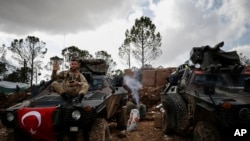Turkish led forces are claiming to have surrounded the city of Afrin, home to several thousand people in northwestern Syria, and the main target of Turkey’s Operation Olive Branch.
The military incursion launched in January seeks to oust the YPG Syrian Kurdish militia considered by Ankara as terrorists linked to a decades long insurgency inside Turkey.
Ankara has warned an operation to capture the city is imminent, “Hopefully Afrin’s center will soon be cleared of terrorists and the local community will be saved from the cruelty and oppression of the terrorists,” declared deputy Prime Minister Bekir Bozdag on Monday.
The prospect of a major offensive on Afrin, which is reportedly packed with civilians, many of whom fled fighting from other parts of Syria, is likely to cause international concern. Ankara insists it is taking all steps to insure the safety of civilians. Deputy Prime Minister Bozdag has claimed not a single civilian has been killed or even wounded since the launch of the Turkish operation.
Turkish led forces backed by air support have made swift advances and suffered only relatively light casualties since January. But analysts suggest the YPG is likely to have withdrawn most of their forces to defend Afrin, where much of the Turkish military’s superiority would be nullified.
Urban warfare
“Under normal combat conditions an ordinary army unit would never enter into an urban environment,” points out Ret. Turkish Brigadier Haldun Solmazturk, a veteran of counter insurgency operations against Kurdish rebels, “It would move to isolate and move on. In an urban environment you lose all the advantages.”
The prospect of Turkish forces widening their control of a large swath of Syrian territory could yet lead to Damascus intervening, “They (YPG) might agree to inviting the Syrian army back into Afrin and keep the Turkish armed forces in a crescent around Afrin, but with the Syrian army in Afrin City,” suggests former senior Turkish diplomat Aydin Selcen, who served widely in the region, “... such a deal, Damascus could either disarm the YPG or facilitate their removal from the region.”
Reportedly Syrian forces have started to build up on the Afrin enclave border. But the YPG has declared it will not surrender and is prepared to resist attempts to capture the city.
With Ankara’s operation in Afrin in its final stage, attention is now moving toward its second declared second phase. Turkish President Recep Tayyip Erdogan has warned Turkish forces that after capturing Afrin they will target YPG forces in Manbij. U.S. forces are deployed in the Syrian City with the Kurdish militia, which is a key ally in Washington’s war against the Islamic State.
Turkish and U.S. officials are currently engaged in diplomatic efforts to avert a clash over Manbij. Turkish Foreign Minister Mevlut Cavusolgu said Tuesday the two sides will reach an agreement when he attends talks next week in Washington.
“Manbij, my sense the Americans will find a formula that Turkey will go to Manbij and the PYD (political wing of the YPG) won't be there, within a few months," predicts international relaxants expert Soli Ozel of Istanbul’s Kadir Has University, “and I think that will be enough for Ankara because this is an easy thing to declare victory.”
Turkish politics
But Erdogan has declared the wider goal of Turkey’s offensive is to remove the YPG presence form the whole of Turkey’s southern border. Analysts point out the military operation is also being driven by powerful domestic considerations. Turkey’s pro government media are claiming since the launch of the Syrian offensive, support has surged for Erdogan, who faces re-election next year.
“Turkish foreign policy making has become so much dependant on domestic political concerns,” points out, analyst Sinan Ulgen a visiting scholar of the Brussels based Carnegie Europe. Ankara has also announced that in May it will launch a military operation in cooperation with Baghdad into Iraqi Sinjar region against PKK bases. The PKK has been fighting a decades long insurgency in Turkey for greater Kurdish rights.
“That Turkey wants to take on the PKK in Sinjar with the cooperation with administration in Baghdad, I have no doubt,” claims international relations expert Ozel, “I have a sense the Iranians would not look favorably at such a thing. I think the Iranians are rather annoyed by what Turkey is already doing.”
Turkey and Iran are historical regional rivals and analysts warn the growing military presence of Turkish forces in countries Tehran considers under its hegemony is likely to cause alarm. “Looking at realities on the ground and the position of different actors, Turkey would be naive to think that Turkey would be able to accomplish all these objectives,” suggest analyst Ulgen, “the limits of the (Turkish) operation will depend on the reaction on other actors who stake holders in the region.”




